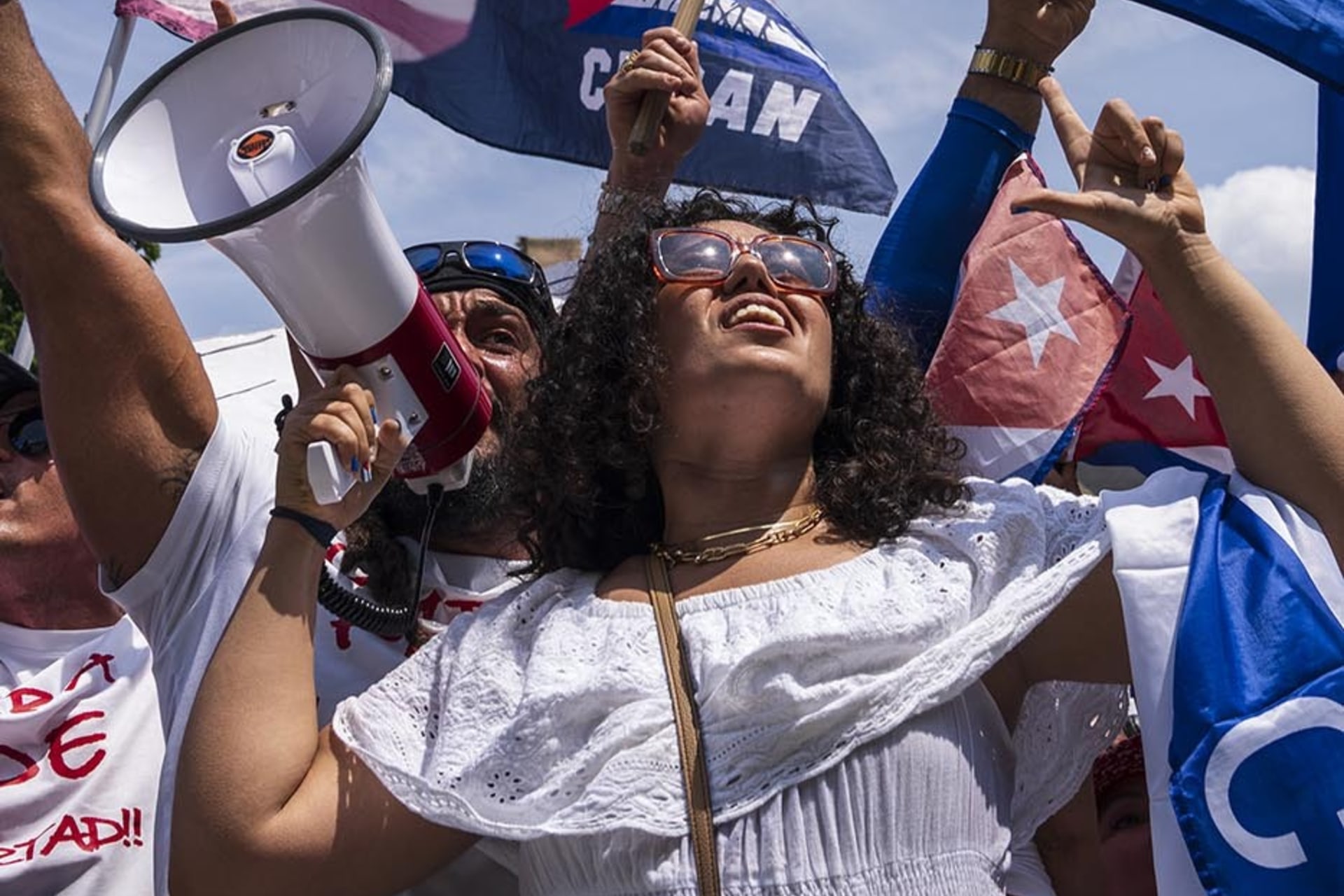Foreign Ownership of U.S. Infrastructure
Published
Updated
One year after the Dubai Ports World controversy, Congress is pushing legislation to reform the committee that reviews foreign investments in American companies. But some business groups think proposals for increased oversight go too far.
This publication is now archived.
Introduction
Congress is again taking up the issue of foreign investment in U.S. infrastructure, nearly one year after the United Arab Emirates-owned company Dubai Ports World set off heated debate with its purchase of a company that ran U.S. ports. Dubai Ports World eventually sold its U.S. operations to an American company, but the central issues of the foreign ownership debate remain far from settled. These questions include how to balance economic openness with national security and how much control foreign companies should be allowed to have over U.S. infrastructure. Right after the Dubai Ports World controversy, Congress proposed the sweeping National Defense Critical Infrastructure Protection Act, aimed at blocking foreign-owned companies from purchasing or operating critical infrastructure. That bill never passed. Meanwhile, increased publicity has only added to the burdens on the U.S. panel charged with monitoring incoming investment, the Committee on Foreign Investment in the United States (CFIUS), which received 73 percent more filings for review in 2006 than it did in 2005.
What new measures are under review in Congress?
A bill pending approval in the House Financial Services Committee aims to set up a panel to oversee the operations of CFIUS. The panel would span twelve separate government agencies and be headed by the Treasury Department. According to February 7 testimony by Clay Lowery, the Treasury Department’s assistant secretary for international affairs, two primary qualms with the bill come from the Bush administration. These are: 1) its requirement that only the two senior-most officials at CFIUS can certify the completion of a review; and 2) a requirement mandating a secondary 45-day investigation of any review involving businesses owned by a foreign government.
What are the business community’s objections to the bill?
Some business groups have shared the basic concern that an overly stringent review process could scare off incoming foreign investment. A January 2007 study by the National Foundation for American Policy, a think tank promoting free market research, concluded that CFIUS’s increased restrictions following Dubai Ports threaten to dampen incoming foreign investment. But Barney Frank (D-MA), the chairman of the Financial Services Committee, has insisted that the pending legislation is sensitive to these concerns. “We will treat you and your money very nicely—that is the message of this legislation,” Frank said at a recent committee hearing, addressing foreign investors.
What concerns are there over foreign companies owning U.S. infrastructure?
The fears over foreign entities owning critical infrastructure generally stem from the belief that foreign companies do not have as vested an interest in security as U.S. firms. Traditionally, U.S. officials have taken measures to keep sensitive military technology and the production of defense-related goods under the control of American companies. But since 9/11, there has been an increasing concern that foreign ownership of certain U.S. infrastructure could make the United States more vulnerable to a terrorist attack.
The most pressing concerns arise when a state-owned foreign company will have a hands-on role in operations. “The issue is less about ownership and more about management,” says Douglas Holtz-Eakin, the former director of CFR’s Maurice R. Greenberg Center for Geoeconomic Studies. While Holtz-Eakin acknowledges that there are legitimate security concerns, it is his view that foreign companies, state-owned or private, should be free to earn money from critical U.S. infrastructure provided they do not have direct operational control. Todd Malan, chief executive officer of the Organization for International Investment, echoes this view, explaining that “ownership [of infrastructure] is a small part of a given vulnerability.”
What has changed since the Dubai Ports World controversy?
The formerly low-profile CFIUS has assumed a tougher posture toward foreign firms seeking to invest in U.S. critical infrastructure. According to a January 2007 report (PDF) by the National Foundation for American Policy, CFIUS’s workload is now far bulkier than it was a year ago: The committee reviewed 73 percent more filings in 2006 than it did in 2005, and had seven second-stage investigations in 2006, as compared to two in 2005. This jump has calmed some nerves, but has also prompted concerns that the agency’s newfound vigilance will scare off foreign investment. Business groups have objected to the restrictions that have been placed on some high-profile companies from ally countries. When the French company Alcatel recently purchased Lucent Technologies, for instance, CFIUS approved the purchase but imposed significant provisions allowing for the deal to be ripped apart retroactively should the U.S. government see fit. A joint venture by the German company Siemens and the Finnish company Nokia to combine their mobile and landline telecom networks has come under similar scrutiny, further bristling business leaders.
What are the benefits of foreign investment for the United States?
David Marchick, who co-authored a July 2006 CFR Special Report on foreign investment and national security, says that “attracting foreign investment is in itself a national security imperative of the United States because foreign investment is critical to the vitality and strength of our economy.” With the U.S. trade deficit in excess of $725 billion in 2005, a steady influx of money from foreign investors is a necessity. As part of a process known as “in-sourcing,” foreign companies employ some 5.3 million American workers in the United States. On average, these workers earn 34 percent more than workers at similar U.S.-owned businesses. Furthermore, foreign companies operating within the United States produce more than 21 percent of all U.S. exports, Malan says.
Welcoming foreign investment is also a fundamental tenet of U.S. trade policy. The aim is to open investment opportunities for U.S. companies abroad while at the same time creating a more stable international system and provide equal opportunities within U.S. borders. “It has been a deep belief of the United States that by taking leadership in economic openness...nations would be knit together,” says Holtz-Eakin.
What is “critical infrastructure?”
Much of the legislation seeking to implement controls on foreign investment focuses on foreign firms which own “critical infrastructure” within the United States. The Patriot Act defines critical infrastructure as systems and assets so vital to the United States that any breakdown in them “would have a debilitating impact on security, national economic security, national public health, or safety.” The National Strategy for the Physical Protection of Critical Infrastructure and Key Assets (PDF), submitted by President Bush in 2003, outlines eleven sectors of critical infrastructure: agriculture and food, water, public health, emergency services, defense industrial bases, telecommunications, energy, transportation, banking and finance, chemical industry and hazardous materials, and postal services and shipping. The ”key assets“ identified in the report are: national monuments and icons, nuclear power plants, dams, government facilities, and commercial key assets.
What foreign entities are most invested in the United States? What do they own?
The country with the most holdings in the United States is the United Kingdom, followed by Japan, Germany, the Netherlands, and France. At the end of 2004, the sum of all foreign assets in the United States had an estimated market value of $2.7 trillion, though only 2 percent of these holdings are owned by state-run companies. Foreign companies’ holdings are most concentrated in the manufacturing sector, but they also extend into several of the eleven “critical” areas identified by the Bush administration. In the energy sector, British Petroleum, Royal Dutch Shell, and Venezuela’s state-owned Citgo all have holdings within U.S. borders. Finland’s Nokia and Sweden’s Ericsson are major telecommunications providers; French-owned Sodexho U.S.A. is the largest food service company in the United States, and even serves meals on Marine Corps bases; and the largest private security firm operating in the United States, Securitas, is based in Sweden.
Middle Eastern entities (excluding Israel) bore the brunt of the ire surrounding the Dubai Ports World purchase. These entities account for about 0.5 percent of foreign investment in theUnited States. However, these companies have some high-profile holdings, including New York’s Plaza and Essex House hotels, the Caribou Coffee Co., and the aircraft manufacturer Cirrus Industries, Inc.
How are foreign investments reviewed?
CFIUS is made up of twelve members, each from a different government agency. The Secretary of the Treasury chairs the committees, but other members include representatives from the departments of State, Defense, Homeland Security, Justice, the U.S. Trade Representative, and the National Security Council.
When the Treasury Department receives notice that a foreign company wishes to purchase a U.S. company or property, it puts in motion a thirty-day review during which each member of CFIUS considers the effects of the purchase on its own jurisdiction. The reviewers have at their disposal the full resources of the U.S. intelligence community. Any concerns raised during the review trigger a 45-day investigation, at the end of which CFIUS makes a recommendation and the president has fifteen days to make a final decision.
CFIUS was originally established in 1975 to monitor the impact of foreign investment. In 1988, Congress passed the Exon-Florio provision of the Defense Production Act, giving the president the authority to block foreign acquisitions on the grounds of national security. The president then delegated the review process to CFIUS. In 1992, the “Byrd” amendment required a thorough investigation of any purchase in which the acquirer is owned or operated by a foreign government. In the case of the Dubai Ports World, which is state-owned, CFIUS failed to conduct an investigation until after Congress raised objections.
Is the CFIUS review process sufficient to protect national security?
Experts disagree. A September 2005 report (PDF) from the Government Accountability Office found that the review board tends to over-prioritize the U.S. open investment policy and noted that some CFIUS members found the process “not sufficiently flexible to protect critical infrastructure.” But Malan says CFIUS “starts from the standpoint that its priority is national security, but it inherently recognizes the need for economic openness.” Marchik agrees. “The [CFIUS] process works very well now. It’s a very rigorous process,” he says. In testimony before the House Financial Services Committee on March 1, he described a series of “network security agreements” that have been negotiated to mitigate the security risk of foreign acquisitions. These include provisions that certain sensitive positions may only be held by U.S. citizens, and measures subjecting U.S.-based facilities to inspection by government agencies on as little as thirty-minutes’ notice.
U.S. lawmakers have criticized what they say is the secretive way the government probes foreign takeovers of U.S. assets on the grounds of national security. Some have called for public hearings on such proposed transactions before a final decision is made. “The biggest problem,” says Holtz-Eakin, “is the absence of transparency in the process.”
Has foreign investment aroused security concerns in the past?
Yes. Ever since the Industrial Revolution in the nineteenth century, the United States has relied on at least some level of foreign investment. Over the years, there were several instances where this threatened national security. In 1915, when a German diplomat accidentally left his briefcase on a train platform, U.S. officials discovered that German investments in the United States were helping to build up the German war-fighting capacity. When the United States entered the First World War, President Wilson seized these assets. In 1927, Congress cited security concerns when it banned foreign ownership of radio broadcasting capabilities.
More recently, concerns raised by U.S. officials blocked the attempted 1987 acquisition of Fairchild Semiconductor Corp., a high-technology manufacturing company, by Japan’s Fujitsu, Ltd. In 2005, congressional uproar prevented the Chinese company CNOOC from purchasing the U.S. energy firm Unocal.t
Colophon
Staff Writers
- Eben Kaplan
- Lee Hudson Teslik





